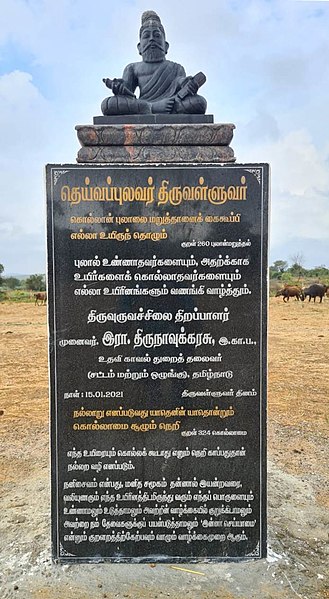Karl Graul was a leader of Leipzig Lutheran mission and a Tamil scholar. He was born in a poor weaver family in Germany. He moved to India as the director of the Lutheran Leipzig Mission in 1849 and there he mastered Tamil.
Portrait of Karl Graul
The Tirukkuṟaḷ, or shortly the Kural, is a classic Tamil language text consisting of 1,330 short couplets, or kurals, of seven words each. The text is divided into three books with aphoristic teachings on virtue (aram), wealth (porul) and love (inbam), respectively. It is widely acknowledged for its universality and secular nature. Its authorship is traditionally attributed to Valluvar, also known in full as Thiruvalluvar. The text has been dated variously from 300 BCE to 5th century CE. The traditional accounts describe it as the last work of the third Sangam, but linguistic analysis suggests a later date of 450 to 500 CE and that it was composed after the Sangam period.
A typical published original Tamil version of the work
The statue of Valluvar, the author of the Kural text, on an island in Kanyakumari facing towards the Tamil Nadu coastline
Statue of Valluvar at an animal sanctuary in Tiruvallur. The plaque describes the Kural's teachings on ahimsa and non-killing, summing them up with the definition of veganism.
Tamil Wisdom, by Edward Jewitt Robinson, 1873, with the traditional portrait of Valluvar





